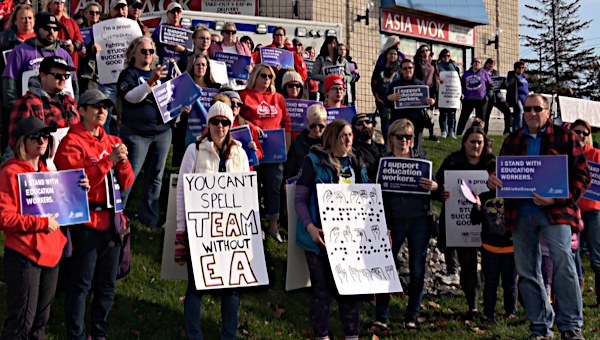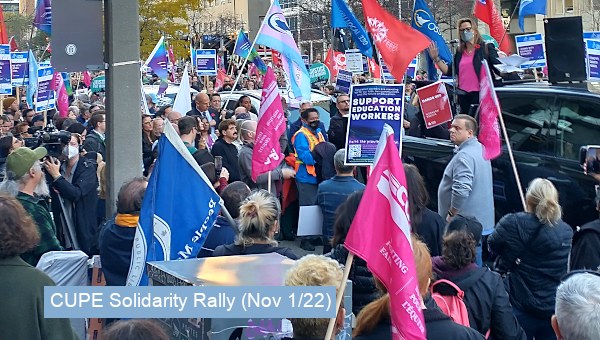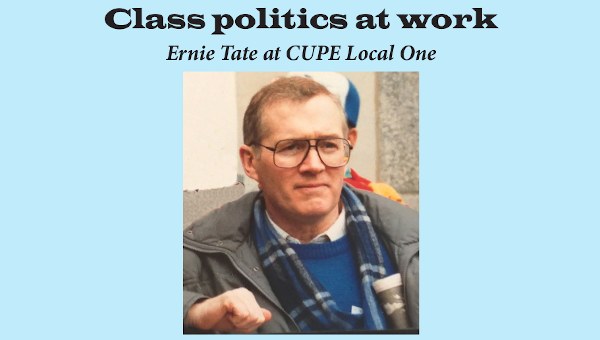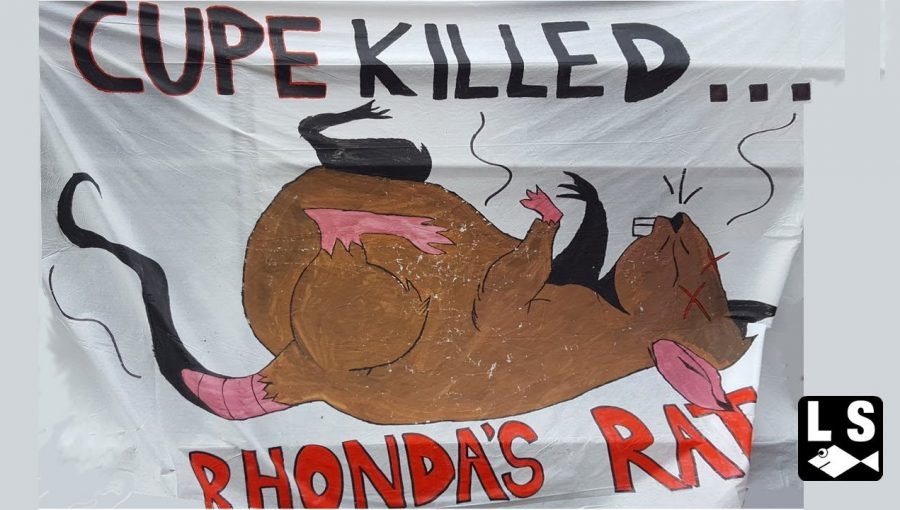Support CUPE 79 and 416 Toronto City Workers on Strike
CUPE workers at the City of Toronto are now into their second week of a strike. They are holding the line against the drive by government and business employers demanding concessions and wage rollbacks. The employers are telling workers they should pay for the economic crisis of capitalism. This is an important struggle for the whole union movement and, indeed, for all struggles for social justice in the coming period. The Bullet presents here two statements in support of Toronto workers, one from the Socialist Project and another from the Ontario Coalition Against Poverty (OCAP). We encourage other movements and organizations also to show their solidarity.
The Socialist Project supports the 24,000 members of CUPE 79 and 416 (Canadian Union of Public Employees) on strike for equity, justice and in defence of the rights they have fought for over past decades. These union members normally work in areas of public health, homes for the aged, parks and recreation, social services, as well as housing and court services, road maintenance, snow removal, animal rescue, as well as garbage and recycling collection.
It’s critical that all unions clearly understand the tremendous dangers they confront if the city workers are defeated: contracts everywhere will be threatened with roll-back and takeaways. It’s urgent that all unions rally to the side of the CUPE locals against their employer.
The City Demands Concessions
The City of Toronto has forced this strike. The City is refusing to offer these workers the 3% wage and benefit pattern already bargained with other municipal unions, such as the police and firefighters, Toronto Housing Corporation, Toronto Port Authority, Toronto Parking Authority and Enwave. The City bargained these contracts knowing full well the financial challenges looming with the economic crisis. They have no legitimate reason to deny the pattern to the 79 and 416 workers. The City has also given a similar pattern to city administrators and elected politicians.
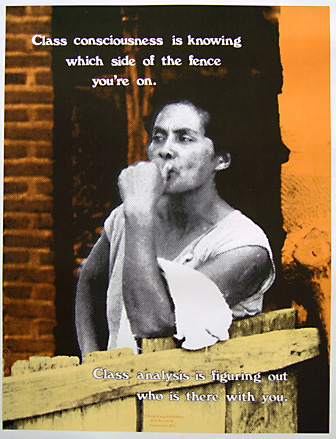
The CUPE unions are also facing 100 pages of other concession demands, including a weakening of job security provisions gained in the last-round of negotiations, attacks on seniority rights, limits on transfer and promotion rights, a freeze on cost-of living increases, two-tiered wage, implementation of seniority rights as well as the well-publicized issue of the banking of sick days.
The last issue has been taken up by City management and the corporate media as their battle-cry. It is standard practice for management to cherry-pick one issue out of many that it can use as a wedge with the public. The reality is that sick day banks are not uncommon in different work environments. They often reflect previously negotiated compromises over wage increases, attendance, sick days, worktime and retirement issues.
The fact that this attack is occurring now is no coincidence. Public opinion is particularly negative about strikes at this moment, given the crisis and most people’s concerns about their own jobs, workplace conditions and overall financial security.
Such views are not an isolated incident: private sector employers and the capitalist state have already set the stage for a broader attack on the working class, as with the massive concessions won against auto workers, also justified on the basis that these workers were somehow “privileged” and a barrier to competitiveness.
Workers Pay for the Crisis
It is clear that the business community and its governments are fully taking advantage of a crisis that has been created by the capitalist system. They are seeking to exploit the crisis to implement a longer-term shift in the balance of power between labour and capital by attempting to weaken unions and further lower the standard of living of all working people. As the assault moves from the private sector to the public sector, they seek to isolate public sector unions from the rest of the working class as well as society as a whole.
The concessions demands and strike have been prompted by the City of Toronto political executive – the Mayor and his ‘cabinet’ composed of the so-called ‘progressive’ wing of Council – and senior administration to lay the basis for lowering salaries and wages of City workers and the further privatization and commercialization of city services. The business community is campaigning for new forms of privatization and non-union provisioning of services.
This is what is behind the attacks on Local 79 and 416. It also drives the 12-week strike in Windsor by 1,900 municipal waste collection, road maintenance, daycare and by-law enforcement workers, members of CUPE Locals 82 and 5432, over demands by that city to impose two-tier benefits on the union.
Toronto Mayor Miller often portrays himself as a friend of labour. He argues that “we are living in a new world,” claiming that the crisis has emptied the city’s coffers. As the Ontario Coalition Against Poverty notes, the Mayor cites rising welfare caseloads as the principal reason the city has to seek concessions – a crude attempt to divide the working class.
Not one of the progressive councillors has yet broken with the Mayor on the strike. Not one has raised the point that the sources of the city’s fiscal crisis are the wider economic crisis and the imposition of regressive neoliberal policies that have bolstered the financial and speculative real estate developers that have come to dominate the Toronto economy. The progressive wing of Council has just let the Mayor, the Toronto Board of Trade, other business associations and the mass media blame the workers.
The City of Toronto is joining the chorus of Bay Street, the auto companies and the capitalist media saying the workers should pay for the crisis rather than the business forces that produced the economic crisis. After having mauled auto workers, it is Toronto’s CUPE workers that stand in the way.
City Politics
The ‘progressive coalition’ at Toronto Council is the alliance between the NDP and Liberals under the leadership of Mayor Miller. This urban coalition started forming a decade ago as long-time inner city councillors from the left moved toward pragmatism in politics with the business community and market-based policies. They moved more and more away from roots in the labour movement and links to socialist politics.
This ‘progressive coalition’ has in practice meant alliances with the business community to leverage minor funding for social projects from major development proposals, most often bending and breaking the city’s own planning guidelines. Urban development initiatives increasingly rely on the shifting of taxes away from commercial interests and a range of subsidies and incentives. The commercialization of public space endlessly penetrates new venues.
Like the ‘third way’ governments of Tony Blair, Bill Clinton and Bob Rae, the workers are being blamed for the fiscal impasse of the city and the economic turbulence from the financial crisis.
We hear little of the mayor’s refusal to mobilize the people of Toronto to demand proper funding levels from the Provincial or Federal governments – when, in the pre-crisis period, they downloaded responsibility for various services to the city without a corresponding downloading of revenue. Miller’s alliance with – and dependence upon – large corporate and financial interests has prevented him from pressuring capital to increase their tax levels to help pay for these services.
This ‘progressive coalition’ has been unable to break from neoliberal urbanism. They are now not providing any alternative to blaming the workers for the city’s fiscal impasse. The strike is straining the coalition and should force union activists and urban social movements to begin to think of new forces, alliances and political capacities beyond it.
Support City Workers
It is necessary for the working class and labour movements to unite behind the struggle of CUPE 79 and 416. The concession demands of the City of Toronto must be defeated to stop the spiral of concessions and defeats from gaining any further momentum. This needs to be part of building a larger working class fightback to the economic crisis.
The Toronto and York Region Labour Council has initiated several important campaigns over the last years. It is clearly necessary to think of large, visible labour/community solidarity campaigns quickly emerging in each of the city’s wards.
The Labour Council has been providing solid leadership on green economy issues. The garbage stewing in city parks, with the continual spraying of pesticides, is causing an ecological disaster to Toronto’s environment. Union environmental committees and ecology activists should be called into emergency caucuses on the issue.
The networks established at the recent Stewards’ Assembly to educate working people on the economic crisis are a potentially an important resource for strike support. The convening of a second Assembly to support municipal workers would be a major step.
The neoliberal urbanism that has come to the City of Toronto over the last decade – with its attacks on workers and progressive social policies – is still setting the political agenda. Winning this strike would be an important blow to its further advance. The same could be said of union contracts everywhere: if CUPE is defeated in Toronto, the concessions movement of employers will gain enormous momentum across Canada and North America. This is a strike the union and working class movement in Canada must win. •
OCAP Stands in Solidarity
with Toronto City Workers
The members of CUPE 416 and 79 who work for the City of Toronto are now on strike. The business media has begun its inevitable campaign of misinformation to produce the greatest possible backlash against these workers. We are encouraged to focus on uncollected garbage and suspended services but not, of course, to give any regard to the rights of public sector workers or to think as working people about what is at stake in this strike.
OCAP (Ontario Coalition Against Poverty), as a matter of basic principle, stands in solidarity with workers’ struggles. We don’t hate or blame workers who have been able to win a living wage or support calls for them to be driven into poverty. Rather, we want to see the poor provided with wages and incomes that raise them out of poverty.
This strike occurs in a context that makes it especially important for all of us that it end in victory and that the concessionary demands of the ‘progressive’ Miller Administration be defeated. The Mayor defended his shameful efforts to gut the collective agreements of City workers by pointing to rising welfare caseloads brought on by the economic downturn. What a disgusting statement. To pit City workers against those who are being forced to turn to the wretched sub poverty pittance that welfare provides is an outrage. This comes from a man who boasts that there are more cops on the streets under his regime than ever before and who is taking us toward an obscene billion dollar a year police budget, while he has frittered away the welfare reserve fund to a fraction of where it was when he took office.
The Mayor points to the state of the economy to justify his attack on City workers. In doing this, he makes clear what side he is on when it comes to who should pay for this economic crisis. As unemployment shoots up, we face the situation with an empty shell of an unemployment insurance system that shuts out most of the unemployed and with a post Mike Harris welfare system that fails to provide the necessities of life. None of the ‘solutions’ to the crisis involve meeting the basic needs of the unemployed and poor. For those who still have jobs and unions, the bankrupt corporations they work for will be bailed out at vast public expense while their rights as workers are destroyed and they are presented with massive concessionary demands.
The process of attacking workers started in the auto industry and other parts of the private sector. The drive for austerity is now spreading, inevitably, to the public sector. Beginning with militant fights by postal workers in the 1960s, public sector workers have spent decades struggling for decent wages and conditions.
The present crisis of capitalism will mean an all out confrontation to take back those gains. Moreover, an attack on the workers who deliver public services can’t be separated from the attack on the services themselves and the rights of those who receive them. That is the context of this strike and we in OCAP know what side we’re on. We call for full support for the City workers. Send messages of solidarity. Be there with them on their picket lines. Stand with them in their fight because they are fighting for all of us. •


